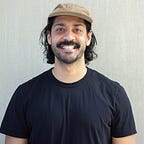Introduction: Anthony Bourdain’s Unlikely Impact on the World of Story
The below is an excerpt of the book “Digital Storytelling: The Rise of User-Generated Content” set to publish May 2021.
I never paid much attention to famous people. Both my brother and sister work in the entertainment industry so I was desensitized to the world of celebrities from an early age.
But I grieved for Anthony Bourdain when I found out he hanged himself in 2018.
Kitchen Confidential, his inaugural book, was one of the first I can remember reading for pleasure and not at the behest of a teacher or parent.
It had drugs, obscene language, antiheroes, kitchen brawls, and a moody yet earnest narrator — everything a young awkward adolescent boy wanted. But it was also a deeply personal look into Bourdain’s emotions as a young man. He connected with readers through a series of personal anecdotes and real-life events — telling us how he felt as if he’d never expressed his real emotions before writing them down.
America doesn’t socialize young men to talk like that. Reading about a man looking inward was completely foreign to me.
His TV shows were equally intimate. But with faces now appearing on screens instead of on the page, he tried to tell the stories of others. He didn’t regularly travel to popular destinations or put out food porn that would help drive book sales.
Bourdain evolved from a nonconformist chef/writer into a renowned archetype for the American traveler. Fans from Myanmar to the Ozarks appreciate his satirical yet somehow flattering dialogue that uses food as a lens in which to analyze people and culture.
Shows like No Reservations and Chef’s Tour can be found in some of the most rural areas of the world (as I can personally attest to after finding Bourdain’s face blown up on makeshift pop-up screens outside food stalls in Malaysia), demonstrating just how far-reaching his fame is.
He told stories he thought deserved more attention. His shows focused the spotlight on unsung heroes around the world, from activists to street cooks, who, Bourdain believed, didn’t get the credit they deserved.
He was on a mission to tell the personal stories behind headline news from the perspective of the people on the ground.
The inaugural episode of his CNN series Anthony Bourdain: Parts Unknown is a prime example of this. In it, Bourdain takes on an extraordinary undertaking: explaining the complex multinational country of Myanmar in a short sixty-minute documentary-style video series.
Mired by over fifty years of colonization and civil war, Myanmar’s history and sociopolitical dynamics are complicated, to say the least. Bourdain realized he wouldn’t be able to do justice to the country’s history by taking pretty pictures of food — nor was he a historian or a professor.
But what mattered most were the perspectives of the people. So, in the same style in which he told his own story in Kitchen Confidential, he focused on dissecting Myanmar through the eyes of the Burmese.
In the documentary, Bourdain interviewed Zarni Bo, a man who had spent six years of his life in prison. Under the backdrop of a café straight out of a Graham Greene novel, the two discussed Bo’s experience in Myanmar. He was an activist and an outspoken critic of the military-run government and was punished for it. After spending his time in prison he was able to see his country open up to the world and slowly enact more equitable policies across its many ethnic groups.
Photograph of a boy walking his bike down an alleyway in Yangon, Myanmar. Shot by me.
Bourdain also interviewed prominent activist-turned-political leader Aung San Suu Kyi. The two discussed the human rights leader’s upbringing and experiences during her infamous fifteen years under house arrest.
“There’s something amazing about meeting people who have been unable to speak. Now, they’re able to tell their stories, unguarded,” Bourdain said of his experience in Myanmar.[1]
He was able to tell the story of an entire country through its people, and that didn’t stop with Myanmar.
He used his unfiltered raw style while shooting the fourteenth episode of season two of No Reservations in Lebanon. In July 2006 Bourdain and a four-member crew witnessed the Israeli airstrikes in Beirut while filming. Instead of scrapping the episode and running to safety, they decided to capture the historic moment in which the country slid back into war on camera.
They filmed smoke billowing atop the international airport, interviewed young Beiruties as they partied through the familiar sounds of explosions, and gave an invaluable firsthand account of how expatriates escaped Lebanon during the attack, reporting all through the eyes of people.
Prominent Lebanese journalist, Kim Ghattas, discussed this historic moment in TV and Bourdain’s storytelling method in The Atlantic.
“Bourdain never made it about Bourdain — Lebanon was the story. And even during the dramatic scene of his departure, on a ship surrounded by Marines and hundreds of other evacuees — Americans and dual citizens — his focus remained on Lebanon and the distraught faces of its people, leaving behind country and family, uncertain of whether they’d ever return,” Ghattas writes.[2]
Through the eyes of their people, Bourdain not only helped tell the story of countries like Lebanon and Myanmar but also gave viewers hope for the future of these developing nations.
Bourdain showed me how valuable and powerful a personal narrative approach to storytelling is in getting your message across. If wielded properly it can be used to increase donations, shift the tides of an election, stop wars, and transform the world’s perspectives of a country.
[1] “Myanmar,” Part’s Unknown, Episode 1, Directed by Anthony Bourdain, April 2013.
[2] Kim Ghattas, “How Lebanon Transformed Anthony Bourdain,” The Atlantic, June 9, 2018.
